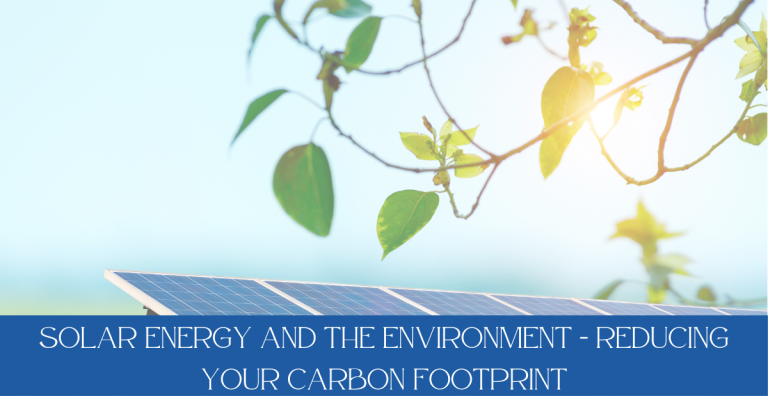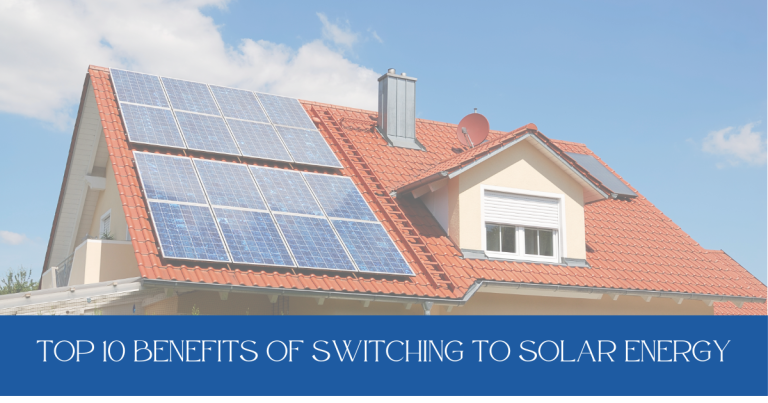
The Top 10 Benefits of Switching to Solar Energy
Switching to solar energy is becoming increasingly popular amoung homeowners. As the world focuses on sustainability, adopting solar energy offers numerous financial, environmental and social benefits. This post outlines the top 10 reasons why solar energy is a smart investment for your home.
1. Reduced energy bills.
One of the most compelling reasons to switch to solar energy in Telford is the potential for substantial savings on energy bills. By installing solar panels on your home, you can generate your own electricity from sunlight. This means that instead of purchasing all your electricity from your utility provider, you can produce a significant portion of it yourself. The amount of energy your solar panels generate will depend on factors like the size of your system, the amount of sunlight your area receives, and your household’s energy consumption.
For many homeowners in Telford, solar energy can reduce electricity bills by 50- 70%. In some cases, when a solar system generates more electricity than a home consumes, excess energy can be sold back to the grid, further increasing savings.
Over time, these savings add up, making solar panels a wise financial investment, especially as utility rates continue to rise. Solar energy offers long-term cost stability and can dramatically reduce the burden of monthlty energy expenses.
2. Protection against rising energy costs.
One of the major advantages of switching to solar energy with Heatseal Solar in Telford is the protection against the inevitable rise in energy costs. Utility rates have historically increased over time, and as demand for electricity grows, prices are expected to continue rising. By installing solar panels, homeowners can shield themselves from these rising costs.
When you generate your own electricity from solar, you become less dependent on your utility provider, which means you are less affected by their rate hikes. With a solar energy system installed by Heatseal Solar in Telford, your electricity costs will become more predictable and stable, making it easier to budget for the long term. Over the lifespan of your solar system (usually 25-30 years), the savings from avoiding rising utility rates can be substantial. This price stability is a key financial benefit of switching to solar energy, providing homeowners with peace of mind and a safeguard against fluctuating energy markets.
3. Increased Property Value.
Solar panels not only help homeowners in Telford save money on energy bills, but they also increase the value of the property itself. Studies have shown that homes equipped with solar energy systems typically sell for more than comparable homes without solar. This is because prospective buyers recognise the long-term financial benefits of owning a home with a renewable energy source, including reduced energy bills and protection from rising electricity coasts.
In some markets, homes with solar panels may sell faster than homes without them, as buyers are increasingly prioritizing energy-efficient features. This means that investing in solar energy can provide a higher return on investment when its time to sell your home. Additionally, solar panels are considered a valuable and modern home improvement, contributing to the overall appeal of your property.
4. Low maintenance Costs.
Solar panels are known for their durability and low maintenance requirements, making them an attractive long-term investment for homeowners. Most solar panels are designed to withstand harsh weather conditions, including snow, rain, and wind, ensuring that they remain functional for decades. The typical lifespan of a solar panel system is 25-30 years, and during that time, the maintenance required is minimal.
Routine maintenance usually involves cleaning the panels a few times a year to remove dirt, debris, or snow that might reduce their efficiency. Some homeowners choose to hire a professional for this task, while others do it themselves. Aside from occasional cleaning, solar panels generally do not require significant upkeep. Inverters, which convert solar energy into useable electricity, may need to be replaced after 10-15 years, but this is usually the only expense over the systems lifespan. This low maintenance nature translates into long-term savings, as homeowners can enjoy decades of reliable energy production with little ongoing cost.
5. Energy Independence.
By adopting solar energy, homeowners in The West Midlands can achieve a level of energy independence that is not possible with traditional energy sources. Generating your own electricity from solar panels installed by Heatseal Solar in Telford reduces your reliance on the grid, protecting you from fluctuations in electricity prices and potential power outages. This is particularly beneficial in regions where electricity prices are volatile or where the grid is less reliable.
For those seeking complete energy independence, solar energy systems can be paired with battery storage solutions. This allows excess solar energy generated during the day to be stored and used during the night or during periods of low sunlight. In some cases, homeowners with solar and storage systems can go entirely off-grid, relying solely on their renewable energy supply. Even without going off-grid, reducing your dependence on external energy sources gives you more control over your energy usage and costs, offering peace of mind and greater financial security.
6. Environmental Impact.
Solar energy is a clean, renewable source of power that offers significant environmental benefits compared to traditional energy sources like fossil fuels. When you switch to solar, you reduce your carbon footprint by decreasing your reliance on coal, natural gas, and oil, which emit harmful greenhouse gases when burned for electricity. Solar energy systems generate electricity without producing air or water pollution, making them a much cleaner option for powering your home.
By choosing solar energy, homeowners in Telford can contribute to the global effort to combat climate change and reduce their environmental impact. The average residential solar energy system can offset several tons of carbon dioxide emissions yearly, equivalent to planting dozens of trees or removing a car from the road. Switching to solar is a practical way for individuals to make a positive difference in protecting the environment for future generations.
7. Job creation.
The rapid growth of the solar industry has led to the creation of millions of jobs worldwide. From manufacturing and installation to sales and maintenance, the solar energy sector offers a wide range of employment opportunities. In fact, solar jobs have been among the fastest-growing job categories in recent years, outpacing traditional energy sectors like coal and natural gas.
For communities, the expansion of solar energy can have a positive economic impact by creating local jobs and driving new business opportunities. By investing in solar energy, homeowners not only benefit themselves but also contribute to broader economic growth and job creation in the renewable energy sector.
8. Reduction of fossil fuel dependence.
Switching to solar energy helps reduce dependence on fossil fuels, which have long been the dominant source of electricity generation. Fossil fuels like coal, natural gas, and oil are finite resources that contribute to air and water pollution, climate change, and environmental degradation. By adopting solar power, homeowners in Telford can play a role in transitioning to a more sustainable energy future.
Solar energy is abundant, renewable, and does not deplete natural resources, making it a cleaner and more sustainable alternative to fossil fuels. As more homeowners and businesses switch to solar, the demand for fossil fuels decreases, helping to reduce greenhouse gas emissions and lessen the impact of human activities on the environment. This shift away from fossil fuels is crucial for achieving long-term sustainability goals and protecting the planet for future generations.
9. Community leadership.
When homeowners in the West Midlands switch to solar energy, they set a positive example for their neighbours and community. Solar adoption is often seen as a sign of environmental and social responsibility, as it demonstrates a commitment to reducing one’s carbon footprint and supporting renewable energy. By leading the way in sustainability, solar-powered homes can inspire others in the community to consider making similar eco-friendly choices.
Communities that embrace solar energy can foster a culture of environmental awareness and sustainable living. This can lead to broader initiatives, such as the creation of local solar coops or community solar projects that make renewable energy more accessible to all residents. In this way, individual decisions to go solar can have a ripple effect, encouraging collective action toward a greener and more sustainable future.
10. Technological Advancements.
The solar energy industry continues to benefit from rapid technological advancements that are improving the efficiency, affordability, and accessibility of solar power. Modern solar panels are more efficient than ever, capable of converting a higher percentage of sunlight into electricity, which means homeowners can generate more power from smaller systems. Additionally, innovations in solar panel design have led to the development of sleek, aesthetically pleasing options that blend seamlessly with the roofline of a home.
Energy storage technology has also seen significant improvements, with more affordable and efficient battery solutions now available. These batteries allow homeowners to store excess solar energy generated during the day for use during night hours or periods of low sunlight, increasing energy independence and resilience. Smart energy solutions, such as solar monitoring apps, allow homeowners to track their energy production and usage in real time, optimising their system’s performance and further increasing savings.
As technology continues to advance, solar energy systems will only become more effective and accessible, making it an even more attractive option for homeowners looking to invest in renewable energy.
In conclusion switching to solar energy offers a wide range of benefits, from financial savings and increased property value to positive environmental impacts and energy independence. With advancements in technology, financial incentives, and growing social awareness, now is the perfect time for homeowners to make the switch to solar energy. Whether you’re motivated by cost savings, environmental responsibility, or energy security, solar power is a powerful investment in both your home and the future of the planet.
Ready to explore how solar can benefit your home? Book your free consultation with our expert team at Heatseal Solar in Telford today! We’ll guide you through the process and answer all your questions—no strings attached. Click here to get started and take the first step towards greener energy!








